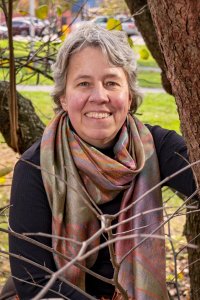Laurel Anderson
Morris Family Professor of Natural Sciences; Shanklin Family Professor in the Department of Biological Sciences
Education
- B.A., Colby College, 1988
- Ph.D., University of Colorado, 1994
About
Laurel "Laurie" Anderson is a plant ecologist and holder of the Morris Family Professorship in Natural Sciences in the Department of Biological Sciences and the Department of Environment & Sustainability at Ohio Wesleyan University. She is also President of the Board of Directors for the Ecological Research as Education Network (EREN) and Chair of the Network Management Team of the Macrosystems Ecology For All Network (MEFA), both projects initiated with funding from the National Science Foundation.
Anderson's research and teaching interests include temperate forest ecology, invasive plants, global environmental change, and developing collaborative ecological projects across small colleges. She has led travel courses on global environmental change in Brazil, Utah, and Alaska.
In 2015, she was recognized as the Ohio Professor of the Year by the Carnegie Foundation for the Advancement of Teaching and the Council for Advancement and Support of Education. In 2022, she was honored with the Eugene P. Odum Award for Excellence in Ecology Education from the Ecological Society of America.
Anderson is also a published poet and loves to explore how intersections among the humanities, arts, and sciences deepen our understanding and connection with the non-human world.
Selected Publications
- Rodgers, V. L.*, Scanga, S. E.* (*Co-First Authors), Kolozsvary, M. B., Garneau, D. E., Kilgore, J. S., Anderson, L. J., Hopfensperger, K. N., Aguilera, A. G., Urban, R. A., Juneau, K. J. 2022. Where is garlic mustard? Understanding the ecological context for invasions of Alliaria petiolata. BioScience, 72 (6): 521–537, https://doi.org/10.1093/biosci/biac012.
- Stack Whitney, K., M. J. Heard, L. J. Anderson, S. Cooke, D. Garneau, J. Kilgore, M. B. Kolozsvary, Kuers, K., Lunch, C. K., McCay, T. S., Parker, A. T. 2022. Flexible and inclusive ecology projects that harness collaboration and NEON-enabled science to enhance student learning. Bulletin of the Ecological Society of America, open access: 00(00):e01963. https://doi.org/10.1002/bes2.1963.
- Hornbach, D., K. L. Shea, J. J. Dosch, C. L. Thomas, T. B. Gartner, A. Aguilera, L. J. Anderson, K. Geedey, C. Mankiewicz, B. R. Pohlad, R. E. Schultz. 2021. Decomposition of leaf litter from native and non-native woody plants in terrestrial and aquatic systems in the eastern U.S. American Midland Naturalist, 186: 51–75.
- Anderson, L. J., J. J. Dosch, E. S. Lindquist, T. S., McCay, J. L, Machado, K. Kuers, T. B. Gartner, K. L. Shea, C. Mankiewicz, V. L. Rodgers, P. A. Saunders, R. A. Urban, J. S. Kilgore, A. S. Powell, B. S. Ramage, J. M. Steinweg, J. N. Straub, S. L. Bunnell, M. Witoksky-Eldred. 2020. Assessment of student learning in undergraduate courses with collaborative projects from the Ecological Research as Education Network (EREN). Scholarship and Practice of Undergraduate Research, 4(1): 15-29.
- Bowne, D.R., B.J. Cosentino, L. J. Anderson, C. P. Bloch, S. Cooke, P. W. Crumrine, J. Dallas, A. Doran, J.J. Dosch, D. L. Druckenbrod, R. D. Durtsche, D. Garneau, K. S. Genet, T. S. Fredericksen, P.A. Kish, M.B. Kolozsvary, F.T. Kuserk, E.S. Lindquist, C. Mankiewicz, J.G. March, T.J. Muir, K.G. Murray, M.N. Santulli, F.J. Sicignano, P.D. Smallwood, R.A. Urban, K. Winnett-Murray, C.R. Zimmermann. 2018. Effects of urbanization on population structure of freshwater turtles across the United States. Conservation Biology. 32(5):1150-1161. DOI: 10.1111/cobi.13136.
- Anderson, L. J., S. L. Bunnell, J. R. Yates. 2017. Improving student learning through an interdisciplinary case study: exploring eutrophication in Lake Erie. Case Studies in the Environment 1: 1-11, DOI: 10.1525/cse.2017.000356.
- Simmons, J. A., L. J. Anderson, D. R. Bowne, J. J. Dosch, T. B. Gartner, M. F. Hoopes, K. Kuers, E. S. Lindquist, T. S. McCay, B. R. Pohlad, C. L. Thomas, K. L. Shea. 2016. Collaborative research networks provide unique opportunities for faculty and student researchers. Council of Undergraduate Research Quarterly 36(4): 12-18.
- Blyth, L. H., L. J. Ouborg*, D. M. Johnson and L. J. Anderson. 2013. The short-term germination and establishment success of deer-dispersed seeds in mesic temperate forests. Journal of the Torrey Botanical Society 140: 334-348.
- Anderson, L. J. and D. Cipollini. 2013. Gas exchange, growth, and defense responses of invasive Alliaria petiolata (Brassicaceae) and native Geum vernum (Rosaceae) to elevated atmospheric CO2 and warm spring temperatures. American Journal of Botany 100: 1-11.
- Bowne, D. R., Downing, A. L., Hoopes, M. F., LoGiudice, K., Thomas, C. L., Anderson, L. J., Gartner, T., Hornbach, D. J., Kuers, K., Machado, J. L., Pohlad, F. B., Shea, K. L.. 2011. Transforming ecological science at primarily undergraduate institutions through collaborative networks. BioScience 61: 386-392.
- Anderson, L. J., J. D. Derner, H. W. Polley, W. S. Gordon, D. M. Eissenstat and R. B. Jackson. 2010. Root responses along a subambient to elevated CO2 gradient in a C3–C4 grassland. Global Change Biology 16: 454-468.
Recipient of the 2007-2009 Libuse L. Reed Endowed Professorship

